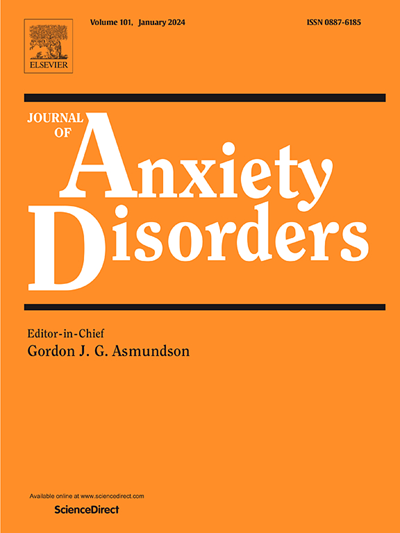Negative emotion differentiation buffers against intergenerational risk for social anxiety in at-risk adolescent girls
IF 4.5
2区 医学
Q1 PSYCHIATRY
引用次数: 0
Abstract
Social anxiety disorder (SAD) tends to emerge during adolescence and is more prevalent among those assigned female at birth. Parental social anxiety confers risk for adolescent SAD but less is known regarding protective factors. Research suggests that emotion differentiation (the ability to discriminate between similarly valenced emotions, e.g., fear vs. sadness vs. anger) may be protective, as it is associated with adaptive psychosocial outcomes. However, little work has examined how emotion differentiation influences the development of SAD, particularly during periods of higher risk such as adolescence. In a longitudinal study of adolescent girls at high temperamental risk for SAD (aged 11–14-years; n=114), we tested whether emotion differentiation (derived using negative and positive emotion ratings from 16-day ecological momentary assessments at baseline) moderated the relationship between parental and adolescent social anxiety symptoms across two years. Results revealed significant moderation by negative (but not positive) emotion differentiation (p=.042): Baseline parental social anxiety was positively associated with adolescent social anxiety symptoms at two-year follow-up but only at lower (vs. higher) levels of emotion differentiation, even after controlling for baseline depressive symptoms. Exploratory analyses showed that these effects were unique to avoidance of social situations (p=.014). Findings highlight the protective effects of emotion differentiation and have important clinical implications for understanding and treating SAD.
消极情绪分化可缓冲高危少女社交焦虑的代际风险。
社交焦虑症(SAD)往往在青春期出现,在出生时就被指定为女性的人群中更为普遍。父母的社交焦虑会给青少年带来社交焦虑症的风险,但对其保护性因素却知之甚少。研究表明,情绪分化(区分类似情绪的能力,如恐惧与悲伤与愤怒)可能具有保护作用,因为它与适应性社会心理结果有关。然而,很少有人研究过情绪分化如何影响 SAD 的发展,尤其是在青春期等高风险时期。在一项针对SAD高危少女(11-14岁;n=114)的纵向研究中,我们测试了情绪分化(使用基线16天生态瞬间评估中的消极和积极情绪评分)是否调节了父母与青少年社交焦虑症状在两年内的关系。结果显示,消极情绪分化(而非积极情绪分化)具有明显的调节作用(p=.042):即使在控制了基线抑郁症状之后,父母的基线社交焦虑与青少年两年随访时的社交焦虑症状呈正相关,但只有在情绪分化水平较低(与较高)时才会出现这种情况。探索性分析表明,这些效应是回避社交情境所独有的(p=.014)。研究结果凸显了情绪分化的保护作用,对理解和治疗 SAD 具有重要的临床意义。
本文章由计算机程序翻译,如有差异,请以英文原文为准。
求助全文
约1分钟内获得全文
求助全文
来源期刊

Journal of Anxiety Disorders
Multiple-
CiteScore
16.60
自引率
2.90%
发文量
95
期刊介绍:
The Journal of Anxiety Disorders is an interdisciplinary journal that publishes research papers on all aspects of anxiety disorders for individuals of all age groups, including children, adolescents, adults, and the elderly. Manuscripts that focus on disorders previously classified as anxiety disorders such as obsessive-compulsive disorder and posttraumatic stress disorder, as well as the new category of illness anxiety disorder, are also within the scope of the journal. The research areas of focus include traditional, behavioral, cognitive, and biological assessment; diagnosis and classification; psychosocial and psychopharmacological treatment; genetics; epidemiology; and prevention. The journal welcomes theoretical and review articles that significantly contribute to current knowledge in the field. It is abstracted and indexed in various databases such as Elsevier, BIOBASE, PubMed/Medline, PsycINFO, BIOSIS Citation Index, BRS Data, Current Contents - Social & Behavioral Sciences, Pascal Francis, Scopus, and Google Scholar.
 求助内容:
求助内容: 应助结果提醒方式:
应助结果提醒方式:


